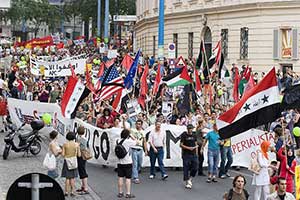25,000 protest Bush’s visit to Vienna
By
John Catalinotto
Published Jun 30, 2006 6:22 AM
Some 25,000 people came out in Vienna June
22 to protest U.S. President George Bush’s visit to the Austrian capital
and especially the U.S. occupations of Iraq and Afghanistan. Bush was attending
a summit of European Union leaders.
The protest’s size and energy
reflected the opinion polls for both the Austrian and European
populations—in Austria only 14 percent support current U.S. policy, while
64 percent think the U.S. plays a reactionary role in world politics. In Europe,
36 percent believe U.S. policies are the greatest danger to world
peace.
Bush traveled with over 500 CIA and other security agents to
organize protection and give orders to the local authorities. In addition, some
3,000 Austrian police were deployed. While they did their worst to keep the
president isolated from the protest, the overwhelming public opposition broke
though.
Willi Langthaler of the Anti-Imperialist Camp (AIC)—one of
the organizers of the protest—reported that: “When Bush drove into
downtown Vienna in his armored vehicle the road blocks brought all life to a
standstill. Activists of the Anti-Imper ialist Camp were uncoiling a huge banner
reading ‘Bush go home’ from the terrace café of a multi-story
building where Bush passed by. He had to see it.
“Other guests at
the café spontaneously held the banner and joined in shouting,
‘Bush go home.’ Even the people below on the street joined in. The
police did not want to interfere. Twenty-seven years ago when a U.S. president
[Jimmy Carter—to sign SALT II] came the last time to visit Vienna people
were standing on the road waving U.S. flags.”
The AIC report noted
that this protest was as large as those that occurred before the March 20, 2003,
invasion of Iraq, but that now there is much stronger popular support for an
anti-imperialist position, including supporting the Iraqi resistance. Awni
al-Kalemji, representing that resistance, spoke at a rally of some thousands.
Although there were two rallies—one more social democratic and one
anti-imperialist—some well-known speakers like British anti-war Member of
Parlia ment George Galloway and German member of the European Parliament Tobias
Pflueger addressed the anti-imperialist rally. This shows that the
anti-imperialist sector of the movement is no longer isolated and has attracted
young people along with representatives of the Turkish and Arab immigrant
community and radical Moslems, and some of the Austrian groups, according to the
AIC report.
Articles copyright 1995-2012 Workers World.
Verbatim copying and distribution of this entire article is permitted in any medium without royalty provided this notice is preserved.
Workers World, 55 W. 17 St., NY, NY 10011
Email:
[email protected]
Subscribe
[email protected]
Support independent news
DONATE


